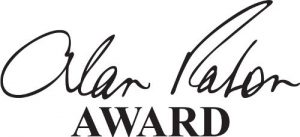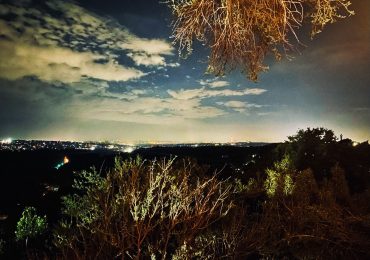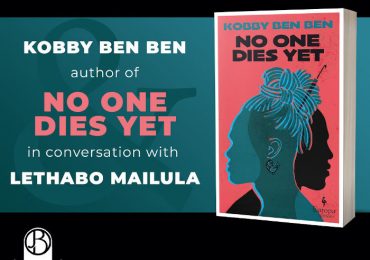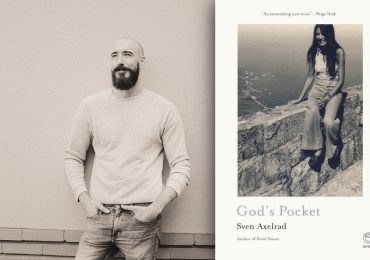The longlists for the 2019 Sunday Times Literary Awards have been revealed!
The duo of awards—the Alan Paton Award for Non-fiction and the Barry Ronge Fiction Prize—celebrate ‘the best of South African non-fiction and fiction’ from the previous year. Each winner receives R100,000.
Last year’s Alan Paton Award winner was Bongani Ngqulunga, for The Man Who Founded the ANC: A Biography of Pixley ka Isaka Seme, while Harry Kalmer won last year’s Barry Ronge Fiction Prize for his novel A Thousand Tales of Johannesburg.
The 2019 Alan Paton Award

From the Sunday Times:
This year marks the 30th anniversary of the Alan Paton Award. It was in 1989, as apartheid began to crumble, that the newspaper announced the new prize, saying: ‘It suggests both a tribute and a hope. The tribute is to Alan Paton, one of South Africa’s great sons, while the hope is that the prize will encourage writers in South Africa to pursue the same standards of excellence and commitment which Paton set for himself.’
The Alan Paton Award for Non-fiction criteria stipulate that the prize should be bestowed on a book that presents ‘the illumination of truthfulness, especially those forms of it that are new, delicate, unfashionable and fly in the face of power’, and that demonstrates ‘compassion, elegance of writing, and intellectual and moral integrity’.
The longlist of twenty-five books was selected by judges Sylvia Vollenhoven, Paddi Clay and Fortiscue Helepi (who has since left the judging panel).
Vollenhoven said, in the Sunday Times announcement:
If there is truth in the assertion that catharsis is the road to healing, then the annual Alan Paton longlist reflects a nation imbibing and dispensing some serious mass medicine. The authors have explored aspects of South Africa as diverse as corruption, the land question, perlemoen poaching and spousal abuse. There are investigations into crime as well as into the history and significance of Boer War generals or 20th century music trends.
South Africa and Zimbabwe’s struggles for freedom are picked apart mercilessly. In the process the Rainbow Nation notion is left wounded, feared dead. We are no longer basking in the indulgent glow of a post-liberation society. The #Fallist generation holds up unforgiving mirrors.
About half of the authors are female. One young writer interrogates recent history from a female and spiritual perspective. Another young woman uses the minutiae of personal memorabilia to make the connection between family and global events. In this collection, our best contemporary authors are seeking solutions, answering complex questions and proposing new ways of looking at the road we have travelled.
2019 Alan Paton Award longlist
- Heist! South Africa’s Cash-in-Transit Epidemic Uncovered by Anneliese Burgess (Penguin Random House)
- My Father Died for This by Lukhanyo and Abigail Calata (Tafelberg)
- Born in Chains: The Diary of an Angry ‘Born-Free’ by Clinton Chauke (Jonathan Ball Publishers)
- These Bones Will Rise Again by Panashe Chigumadzi (Jacana Media)
- Breaking a Rainbow, Building a Nation: The Politics Behind the #MustFall Movements by Rekgotsofetse Chikane (Picador Africa)
- Sorry, Not Sorry: Experiences of a Brown Woman in a White South Africa by Haji Mohamed Dawjee (Penguin Random House)
- Poacher: Confessions from the Abalone Underworld by Kimon de Greef and Shuhood Abader (Tafelberg)
- Confronting Apartheid: A Personal History of South Africa, Namibia and Palestine by John Dugard (Jacana Media)
- Brutal Legacy: A Memoir by Tracy Going (MFBooks Joburg)
- Beaten But Not Broken by Vanessa Govender (Jacana Media)
- Your People Will Be My People: The Ruth Khama Story by Sue Grant-Marshall (Protea Boekhuis)
- The Café de Move-on Blues: In Search of the New South Africa by Christopher Hope (Penguin Random House)
- Rainbow Nation My Zulu Arse: A Voyage Around Mzansi—Rants and Raves Included by Sihle Khumalo (Umuzi)
- You Have to be Gay to Know God by Siya Khumalo (Kwela Books)
- Everyone is Present by Terry Kurgan (Fourthwall Books)
- Becoming Him: A Trans Memoir of Triumph by Landa Mabenge (MFBooks Joburg)
- The Lost Boys of Bird Island: A Shocking Exposé from within the Heart of the NP Government by Mark Minnie and Chris Steyn (Tafelberg)
- And Then Mama Said … Words that Set My Life Alight by Tumi Morake (Penguin Random House)
- Born to Kwaito: Reflections on the Kwaito Generation by Esinako Ndabeni and Sihle Mthembu (Blackbird Books)
- Imprisoned: The Experience of a Prisoner Under Apartheid by Sylvia Neame (Jacana Media)
- The Land Is Ours: South Africa’s First Black Lawyers and the Birth of Constitutionalism by Tembeka Ngcukaitobi (Penguin Random House)
- Louis Botha: A Man Apart by Richard Steyn (Jonathan Ball Publishers)
- I Beg to Differ: Ministry Amid the Teargas by Peter Storey (Tafelberg)
- The Echo of a Noise: A Memoir of Then and Now by Pieter-Dirk Uys (Tafelberg)
- Ministry of Crime: An Underworld Explored by Mandy Wiener (Pan Macmillan)
The 2019 Barry Ronge Fiction Prize

From the Sunday Times:
This is the nineteenth year of the Sunday Times fiction prize, named after Barry Ronge, the arts commentator who was one of the founders of our literary awards. The criteria stipulate that the winning novel should be one of ‘rare imagination and style … a tale so compelling as to become an enduring landmark of contemporary fiction’.
The longlist of twenty-five books was selected by judges Ken Barris, Nancy Richards and Wamuwi Mbao.
Barris said:
It has been a joy reading most of the books on the Barry Ronge Prize longlist, given the excellence and variety of this year’s crop.
Children at risk and under fire were beautifully explored in several of the novels, with well-informed treatments of autism, obsessive compulsive disorder, and homelessness.
There were narratives of failed and successful love, and a couple of fascinating magical realist novels. As always, there were journeys into the apartheid past, with some speaking more directly into the present than others.
Two of the novels opened windows into the harsh lives of ordinary people that middle-class citizens tune out so well. One relates the experiences of a family after the Aids-induced death of a loved one. The other is about a group of undocumented immigrants from Zimbabwe, coming to Johannesburg in search of a better life, focusing on their vulnerability and total absence of protection.
There was a fair sprinkling of translated works, and genre fiction was also well represented (one spy, two crimes, and one science-fiction and fantasy apiece).
The judges noted a disappointing cross-section of badly edited work, resulting in repetitive, sometimes disorganised narrative, and overburdened dialogue. We understand that publishers face resource constraints, but felt that this is something requiring more attention.
That said, the best of these novels were glorious. It’s in the nature of judgement to exclude as much as select, so difficult choices will have to be made in the end!
2019 Barry Fiction Prize longlist
- Babatunde’s Heroic Journey: from Nigeria to Ukraine via Russia by Nape `a Motana (Sulis International Press)
- Red Dog by Willem Anker (Kwela Books)
- Knucklebone by NR Brodie (Pan Macmillan)
- A Spy in Time by Imraan Coovadia (Umuzi)
- Talion by Beyers de Vos (Penguin Random House)
- The Enumerations by Maire Fisher (Umuzi)
- Patagonia by Maya Fowler (Umuzi)
- All Things Bright and Broken by Carol Gibbs (Jacana Media)
- The List by Barry Gilder (Jacana Media)
- A Tree for the Birds by Vernon Head (Jacana Media)
- The White Room by Craig Higginson (Picador Africa)
- An Unquiet Place by Clare Houston (Penguin Random House)
- The Boy Who Could Keep a Swan in His Head by John Hunt (Umuzi)
- The Ones with Purpose by Nozizwe Cynthia Jele (Kwela Books)
- The Hum of the Sun by Kirsten Miller (Kwela Books)
- Called to Song by Kharnita Mohamed (Kwela Books)
- Michael K by Nthikeng Mohlele (Picador Africa)
- The Theory of Flight by Siphiwe Gloria Ndlovu (Penguin Random House)
- The Broken River Tent by Mphuthumi Ntabeni (Blackbird Books)
- The Gold-Diggers by Sue Nyathi (Pan Macmillan)
- Too Many Tsunamis by Vincent Pienaar (Penguin Random House)
- Under Glass by Claire Robertson (Umuzi)
- Parts Unknown by Zirk van den Berg (Kwela Books)
- Theo & Flora by Mark Winkler (Umuzi)
- The Season of Glass by Rahla Xenopoulos (Umuzi)
Judge biographies:
Alan Paton Award judges
Sylvia Vollenhoven (chair) is a writer, journalist and filmmaker whose work has won many awards including the 2016 Mbokodo Award for Literature and the Adelaide Tambo Award for Human Rights in the Arts. Vollenhoven was the South African producer for the BBC mini-series Mandela the Living Legend, and is also a Knight Fellow, funded by the John S and James L Knight Foundation with additional support from the Bill & Melinda Gates Foundation.
Paddi Clay has more than forty years of experience in the media, covering radio, print and online journalism. She has a BA Degree in English and Drama from UCT and an MA in Journalism Leadership from the University of Central Lancashire, UK. Clay has reported for the Rand Daily Mail and Capital Radio, and wrote for the FT and US News and World Report. A lifelong campaigner for freedom of expression and a free, independent media, she spent fifteen years as head of the Graduate Journalism Training Programme at what is now Tiso Blackstar and retired in January 2017. She continues to coach and lecture.
Barry Ronge Fiction Prize judges
Ken Barris is a writer, editor and photographer, and former academic. His fiction has been translated into German, Danish and Turkish, and he has won various literary awards for novels, short stories and poetry. These include the Ingrid Jonker Prize, M-Net Book Prize, Thomas Pringle Award, University of Johannesburg and the Herman Charles Bosman Prize.
Nancy Richards is an independent journalist with many years of experience in radio and print. She is the founder of NPO: Woman Zone and the Women’s Library (initiatives to encourage women of different backgrounds, cultures and communities to share their stories with one another). She’s the author of Beautiful Homes and the co-author of two books: Woman Today: 50 Years of South African Women on Radio and Being a Woman in Cape Town. Richards is a speaker, media trainer and proud to be a board member of Soil for Life—a non-profit that helps people learn how to grow healthy, organic food.
Wamuwi Mbao is a writer and essayist. He reviews fiction for the Johannesburg Review of Books, and teaches South African literature at Stellenbosch University. His short story ‘The Bath’ was listed as one of the twenty best stories of SA’s democracy.





